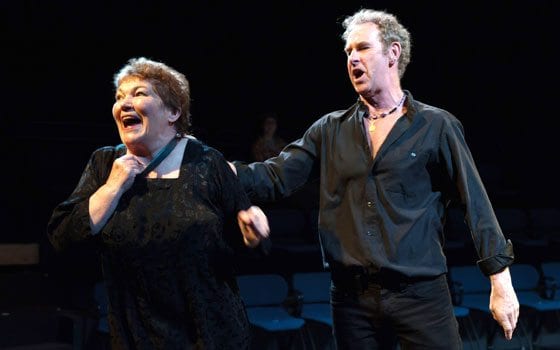
Renowned Shakespearean actress Tina Packer is equally convincing as a steely Lady Macbeth, an impassioned Juliet and an anguished Desdemona.
Packer plays all these women and more in her exploration of Shakespeare’s heroines, “Women of Will.” Directed by Eric Tucker and presented by the Nora Theatre Company at Central Square Theater in Cambridge, the production distills Packer’s investigation into Shakespeare’s female characters, insights she has gleaned from directing and performing nearly all of Shakespeare’s plays.
The founder of Shakespeare and Company and until 2009 the artistic director of the 34-year-old company, Packer has crafted an intimate, five-part sampling of Shakespeare’s canon. Each part explores a new turn in Shakespeare’s evolving understanding of women.
“Women of Will: The Overview,” is on stage through Oct. 30. From Nov. 4-6, Packer will perform “Women of Will: The Complete Journey,” which expands the overview into five full-length performances over three days.
By no means a shorthand version, the overview is a richly packed evening of theater. Together with fellow Brit Nigel Gore, a seasoned actor who is a natural as her partner, Packer performs a chronological sampling of scenes from plays throughout Shakespeare’s career. In between, she conducts a conversational master class with the audience. Occasionally, the two actors pull an audience member into the action to play a listening father or lord or the minister to whom their characters recite marriage vows.
In a rip-roaring prelude from “Taming of the Shrew,” Packer as Kate lets Gore’s Petruchio yank her by a belt that circles her neck like a dog collar as she obeys his command that she call the sun the moon.
The gallery of females that Packer enacts contrasts the brute force associated with men to the inner power of Shakespeare’s later heroines.
The production’s unadorned staging puts the focus on the virtuoso acting. The few props include a sword, hand-held lanterns and a trunk that doubles as a seat. Packer’s androgynous all-black ensemble — a tunic, pants and knee-high boots — suits the roles she plays from Shakespeare’s comedies: women who disguise themselves as men to make their way in the world. She dons a floor-length scarlet cape to play women who don’t conceal themselves and in some situations suffer the consequences.
In a marathon performance that combines lyricism and physical prowess, the two virtuoso actors are on their feet for more than two hours speaking hundreds of glorious lines with flawless clarity and truth to character. At the same time, they dramatize the power struggles between Shakespeare’s men and women with their whole bodies as they vigorously wrestle, stab, toss and embrace each other.
Packer, 73, is a large woman who readily takes to earthy, fire-breathing parts. Yet, vivid as she is, Packer never overplays her roles. She has the restraint to convey emotion with the set of her chin or the tension of her body. She can assert disdain with her voice and express a young girl’s tenderness with her fingertips. The kaleidoscopic variety of emotions she can register as she conjures a variety of women is a wonder to behold.
Packer moves from the vanquished Kate to “warrior women” such as Queen Margaret of Anjou who negotiate power and then to Juliet, Shakespeare’s first heroine to equal her lover in intelligence, imagination and courage.
After the intermission, Packer’s portrayals compare the fate of women who pretend to be men with those who speak the truth and die. In one of the evening’s bravura feats of acting, Gore’s Othello, astride Packer’s Desdemona, ignores her pleas and prepares to strangle her. In a split-second switch, the actors become Orlando playfully wooing his pal Ganymede, unaware that the lad beneath him is the girl he pines for, Rosalind, in disguise.
In a searing scene, Packer’s Lady Macbeth convinces her husband to murder his friend and become king. Packer tells us that she is one of the females in Shakespeare’s mature tragedies who adopt the same kind of power that embroils men in endless cycles of revenge and war.
“When women do not offer an alternative way of doing things,” says Packer, “chaos breaks out.”
In Shakespeare’s late plays, Packer observes, daughters forgive fathers and create a new order that rises beyond tragedy. In her one unpersuasive scene, drawn from “Pericles, Prince of Tyre,” Packer portrays the daughter of Pericles, Marina, as a kind of a New Age healer, her hands mimicking Reiki as she calms the addled prince.
But having already made her case with strong moral and artistic force, Packer can afford a few quirky choices.
In “King Henry VIII,” Packer tells us, Shakespeare celebrates this female model of power that brings life out of chaos in a eulogy to his patron, Queen Elizabeth. Although her father was a murderous king, she presided with benevolence over a stable England. Letting a bundle of red fabric represent the newborn Elizabeth, Packer and Gore conclude their evening by reciting Shakespeare’s rhapsodic eulogy to the queen.
Packer is a consummate guide to Shakespeare. Her exploration of his women, like the plays themselves, invites us to consider our own understanding of power.






